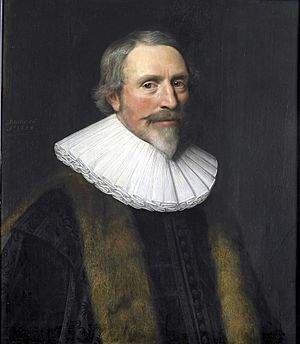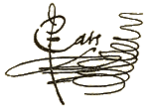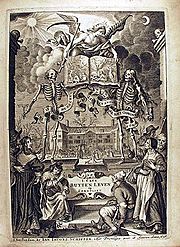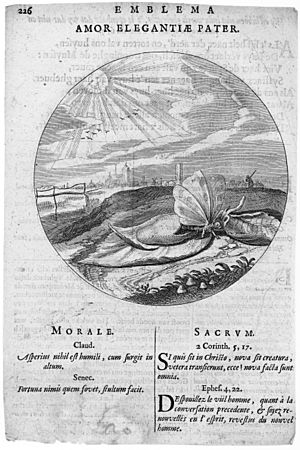Jacob Cats facts for kids
Quick facts for kids
Jacob Cats
|
|
|---|---|

Portrait by Michiel Jansz. van Mierevelt, 1634
|
|
| Born | 10 November 1577 Brouwershaven, Spanish Netherlands |
| Died | 12 September 1660 (aged 82) The Hague, Dutch Republic |
| Occupation | Poet, writer, politician |
| Education | Law |
| Period | Dutch Golden Age |
| Genre | Emblem books |
| Notable works | Het Spaens Heydinnetje |
| Spouse | Elisabeth van Valckenburg |
| Children | Anna, Johannes, Cornelis, Elisabeth, Helene & Jacobus Cats |
| Signature | |
 |
|
Jacob Cats (born November 10, 1577 – died September 12, 1660) was a famous Dutch poet, writer, and politician. He was also a lawyer. He is best known for his special books called emblem books, which used pictures and poems to teach moral lessons.
Contents
Early Life and Education
Jacob Cats was born in Brouwershaven on November 10, 1577. He lost his mother when he was young, and he and his three brothers were raised by his aunt and uncle.
He went to school in Breda and later studied law in Rotterdam and Paris. After finishing his studies, he became a lawyer in The Hague. He became well-known for his legal work, even defending someone accused of witchcraft.
Around this time, Jacob Cats became very ill. He traveled to England for medical help but didn't get better. He returned to Zeeland, where he eventually recovered. In 1605, he married Elisabeth van Valckenburg, who was from Antwerp. They moved to Grijpskerke in Zeeland, where he started farming and writing poetry.
Political and Diplomatic Career
In 1621, a peace agreement with Spain ended. This led to problems with the dykes (walls that protect land from water), which forced Jacob Cats to leave his farm. He then became a "pensionary" (a type of magistrate or official) in Middelburg. Two years later, he became pensionary of Dordrecht.
In 1627, Jacob Cats went to England on a special mission to King Charles I, who made him a knight. This was a great honor.
Later, in 1636, he was given a very important job: Grand Pensionary of Holland. This made him the most powerful official in the Dutch Republic. In 1648, he also became the keeper of the Great Seal, which was used to make official documents valid.
He retired from these jobs in 1651. However, in 1657, he was sent to England a second time for another mission to Oliver Cromwell, but this mission was not successful.
Later Years and Poetry
After retiring, Jacob Cats moved to his beautiful villa called "Sorghvliet" (which means "Fly From Worry"). This house was surrounded by a large and famous garden. Today, the house is known as "Catshuis" and is the official residence of the Dutch Prime Minister.
At Sorghvliet, he spent his time writing his autobiography, Eighty-two Years of My Life, and more poems. He became very famous during his lifetime for his moralistic Emblem books, especially Sinne en Minnebeelden. These books used pictures and short poems to teach lessons about life and good behavior.
Jacob Cats passed away on September 12, 1660, and was buried with a large ceremony in The Hague. Even today, many Dutch people still call him "Father Cats."
He lived during the Dutch Golden Age, a time when many great Dutch writers like Hooft and Vondel were active. Jacob Cats was very popular in his home country for almost 200 years. It is said that his complete collection of poems sold about 50,000 copies, and it was often the only book found in Dutch homes besides the Bible.
A statue was built in his honor in Brouwershaven in 1829.
Notable Works
Jacob Cats wrote many popular books of poetry and emblems. Here are some of his well-known works:
- Emblemata or Minnebeelden with Maegdenplicht (1618)
- Selfstryt (1620)
- Houwelick (1625)
- Proteus Ofte Minne-Beelden Verandert In Sinne-Beelden. (1627)
- Spiegel van den ouden en nieuwen Tyt (1632)
- Ouderdom, Buytenleven en Hofgedachten op Sorgvliet (1664)
- Gedachten op slapelooze nachten (1661)
His book Houwelick even describes the garden of his neighbor, Hortensia del Prado.
Legacy
Jacob Cats' moral poems were very popular and were often told and retold like nursery rhymes for many generations. Even today, some of the phrases he created are still used in everyday Dutch language.
Many of his moral poems were turned into songs. A collection of these songs, Klagende Maeghden en andere liederen, was recorded in 2008 by a group called Camerata Trajectina.
See also
 In Spanish: Jacob Cats para niños
In Spanish: Jacob Cats para niños
 | Jackie Robinson |
 | Jack Johnson |
 | Althea Gibson |
 | Arthur Ashe |
 | Muhammad Ali |



